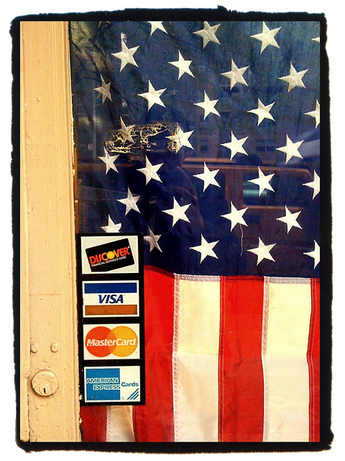
A Washington-induced budget sequestration? Ha! We should be so lucky.
No, I’m talking about personal credit card debt, which appears still to be ravaging many Americans, and particularly those over the age of 50, five years after the recession began.
The policy and advocacy group Demos, together with AARP, just released the results of a survey that looked at the credit-card debts of primarily middle-income Americans young and old. (Read it here, and read this report, as well.) The survey focused on those who have carried such debt for three months or more, and the results don’t exactly induce warm and fuzzy feelings about their future, or ours.
| | Apparently, a lot of baby boomers are not running off to an easy retirement in Belize. They aren’t looking for that perfect home near a golf course, where they can while away the hours arguing with their homeowner’s association. They’re hoping to just keep roofs over their heads. And forget about the notion that older people are more prudent and careful with money than the young whippersnappers. At least when it comes to people who carry debt, this survey found quite the opposite — middle-income Americans over 50 now owe more on cards than those under 50. The older set carries an average combined balance of $8,278, compared with $6,258 for the younger set. The good news is that these balances fell over the past five years for both age categories, but it fell just 16 percent for the older folks, which is like tossing some furniture off the Queen Mary. There is reason to believe that at least some of the younger people improved their debt situation only because their older relatives bailed them out — using credit cards. Twenty-three percent of older Americans in the survey said they used cards to pay off the debts of relatives. In turn, 18 percent of the people surveyed between ages 50 and 64 dipped into their retirement savings to pay their credit card bills. Generosity is admirable, but the grim financial reaper isn’t shedding any tears. When it comes to the reasons people charge, there are few surprises. Forty-nine percent of older Americans do so to pay for car repairs, and 38 percent used them for home repairs. Younger people are much more likely to charge non-essential items, either small or large. About a quarter or both age categories reported losing a job and having to rely on credit cards to live. Half of the older indebted Americans charged health care costs, carrying an average balance of $893. About a third of people in all age categories said they had postponed health treatments or prescription purchases because they no longer could afford them. The survey doesn’t offer a lot of reason for hope. Virtually everyone is going to need a sudden repair or health care, especially as they get older. Once you begin relying on a plastic safety net, the hole just seems to get bigger and bigger. When the survey asked about strategies, the answers ranged from looking forward to a tax refund, to taking an extra job, to raiding those retirement funds. In other words, their ideas are just as realistic as the meaningless battles in Congress over tax hikes or spending cuts. It’s easy to over-react to surveys like this. A little in-home sequestration would be good for some people. But it’s also easy to feel a false sense of smugness. The report offers a glimpse at a portion of the public that lives above its means, but not all people with credit card debts are irresponsible. Health care costs pose a genuine challenge, as does the sudden loss of employment. And the debts these folks have will need to be settled somehow, eventually. Whether it ends in bankruptcy, ruined credit, the loss of a home or a write-off by a hospital or financial institution, society bears some of the cost. Whether in Washington or at the kitchen table, when bills come due and no one has a long-term plan, it’s never pretty. |

 RSS Feed
RSS Feed

